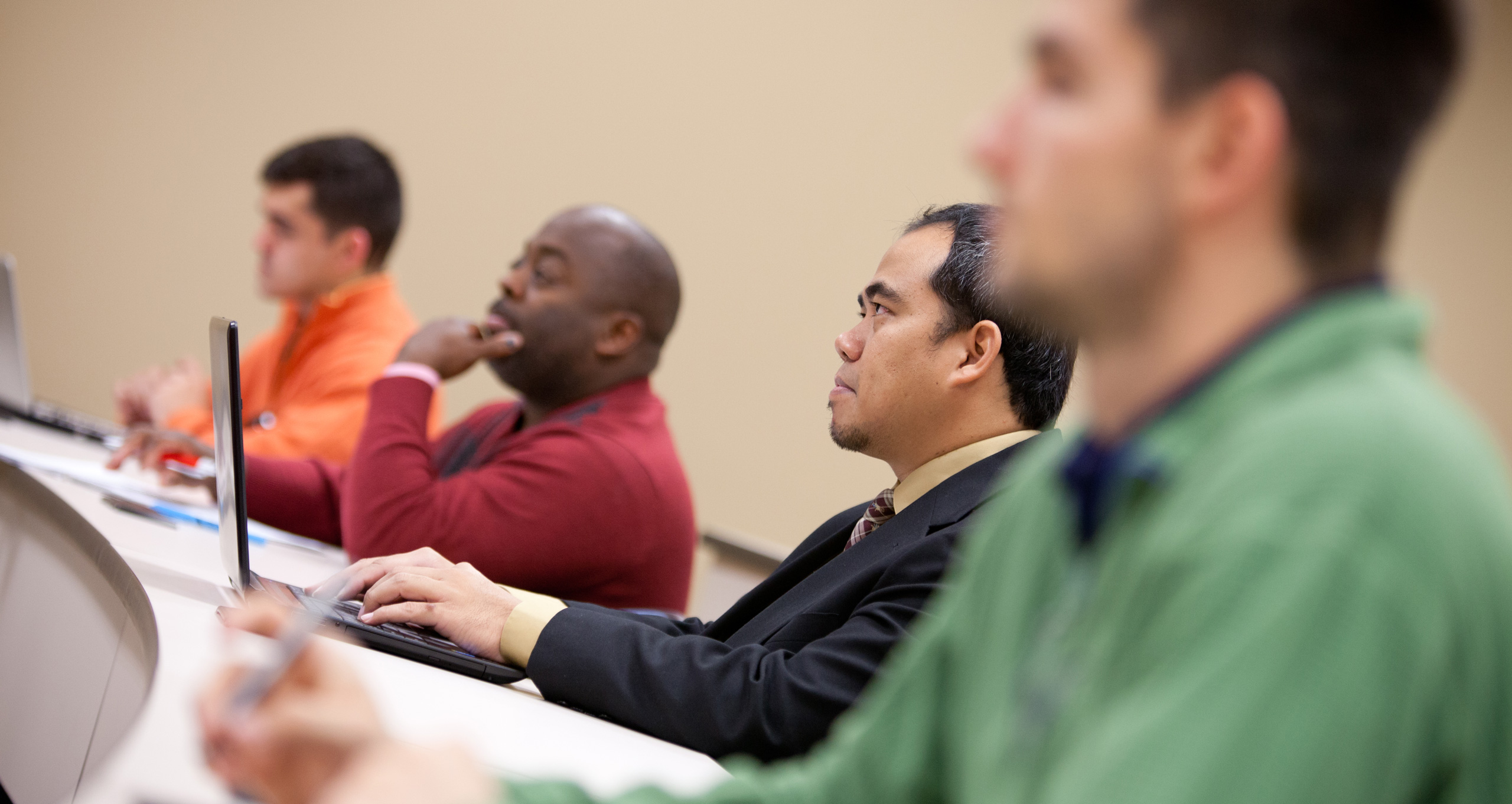Program Faculty
-
 Matt Akers, PhD
Matt Akers, PhDAssociate Dean of the Seminary; Chairman of the Old Testament Department; Associate Professor of New Testament and Greek, Old Testament and Hebrew, Missions, and Biblical Counseling; Director of the Hispanic Institute
Phone: 901-751-3053 Email: makers@mabts.edu
Questions?
We’re here to help.
Doctoral Department
Memphis Campus
2095 Appling Road
Cordova, TN 38016
Rebecca McClain
P: 901-751-3011
E: rmcclain@mabts.edu
Doctor of Ministry (DMIN) Program
The Doctor of Ministry (DMIN) degree is an advanced professional degree designed to enable students to practice ministry at a high level of competency. The program builds on the general theological preparation of the Master of Divinity degree and moves toward a concentration that combines theory and significant experience. The professional character of the degree is designed to prepare students to be effective in the practice of ministry rather than preparing for research and teaching vocations. The program of study integrates the classical disciplines of biblical, historical, theological, social, and linguistic studies with those significant tasks of one involved in the practice of ministry. It assists those whose responsibilities range broadly in pastoral, missionary, or administrative ministries by enhancing both competency and excellence in the practice of ministry.
Six Doctor of Ministry specializations are offered:
- Doctor of Ministry in Biblical Counseling
- Doctor of Ministry in Christian Ministries
- Doctor of Ministry in Church Revitalization
- Doctor of Ministry in Expository Preaching
- Doctor of Ministry in Missions
- Doctor of Ministry in Pastoral Ministry
This degree is available online
Educational Objectives of the Doctor of Ministry Program
The Doctor of Ministry program is expected to accomplish the following objectives:
- To enable participants to develop a theology of ministry which is responsive to both the leadership of God and the needs of the church, or ministry in which they serve
- To satisfy the demand for continuing education in ministry
- To renew the personal life of faith and servanthood of the participant
- To stimulate continued growth in biblical and theological foundations
- To develop skills that facilitate intellectual inquiry, creativity, and critical thinking
- To enable participants to communicate the truth of God’s Word effectively with greater competency in the total practice of ministry
- To enable those serving in mission ministries to gain competence in the practice of mission ministries
- To enable the participant to acquire a sensitivity for the needs of society, thus preparing the participant for excellence in ministry leadership in a complex and changing world.
System of Study
The system of study employed by the DMIN program at Mid-America Baptist Theological Seminary is designed to take three to five years to finish, though some students may choose to extend their time in the program. The modified cohort system will operate as follows:
- Upon satisfactory completion of all the prerequisites required for admission, students will receive notification of their acceptance and will begin seminar work in the next available semester.
- From that point on, students will follow the prescribed curriculum according to one of the six Doctor of Ministry specializations: biblical counseling, Christian ministries, church revitalization, expository preaching, missions, or pastoral ministry.
Admission Requirements and Procedures for the Doctor of Ministry Program
Undergraduate Degree Requirements
Applicants must have a Bachelor of Arts degree or its equivalent from an accredited college or university. Any exception must be approved by the doctoral programs committee.
Seminary Degree Requirements
Applicants normally will have completed the Master of Divinity degree or its equivalent from an accredited institution. Biblical language requirements are six semester hours of Greek and six semester hours of Hebrew. Other master’s degree work may be acceptable with approval from the doctoral programs committee. Leveling courses may be required (see Catalog). An applicant must have maintained an average of 3.0 on a scale of 4.0 in their master’s degree work.
Field Experience Requirements
The Doctor of Ministry degree is the most advanced professional degree any seminary can offer. Because Mid-America is committed to preparing persons for the most effective ministry possible, we believe significant ministry experience contributes to that end. The completion of the Doctor of Ministry degree, therefore, requires two years of pastoral ministry, church staff service, missionary service, or denominational service. Final evaluation of the completed practical experience is made by the doctoral programs committee.
International Students
Applicants from international seminaries offering the Master of Divinity or its equivalent may be admitted to the Doctor of Ministry program on the same basis as students from national seminaries, provided they score a minimum of 600 on the paper-based TOEFL examination or 100 on the internet-based TOEFL. Refer to Admissions Procedures for International Students in the Catalog.
The Procedure for Admission to the Doctor of Ministry Program
An applicant must complete all procedures and requirements for approval by the Seminary’s doctoral programs committee. Applicants will receive notice of approval from the Associate Dean of Doctoral Programs. The application must be complete by May 15 or September 15 to enter the program in the fall or spring, respectively. Applicants must perform satisfactorily on the Graduate Record Examinations (GRE) to demonstrate competency to function at the graduate level. The GRE can be taken at any of the regional testing centers. Evaluation of test results is consistent with the practice of similar educational institutions and is in conformity to performance scales published in the GRE scores interpretation resources and corroborating research reports. The MABTS code number, 2234, must be used to report GRE Test Scores.
Essay
An applicant must submit a 10-page essay that includes the following components:
- Three pages of autobiography
- One page giving a brief personality sketch
- Two pages describing the applicant’s vocational experience and ministry intentions
- Four pages relating to the applicant’s personal view of Christian ministry
The essay is to be written in accordance with A Manual for Writers of Term Papers, Theses, and Dissertations (latest edition), by Kate Turabian (Chicago: University of Chicago Press, 2013).
Conditional Admission
An applicant may be admitted on a conditional basis for the first year of study in the doctoral program at the discretion of the doctoral programs committee. The Associate Dean of Doctoral Programs will notify the applicant of the reasons for any conditional status, specify any requirements that must be fulfilled, and state any limitations to be imposed upon the projected seminar load. Students admitted conditionally are evaluated at the conclusion of the first year of study, and the doctoral programs committee governs the student’s continuance in the program. Exceptions to the published admissions requirements for the Doctor of Ministry program must be approved by the faculty.
Time Limit for Approved Applicants
Applicants for the Doctor of Ministry program who do not enroll in a seminar within one year from the date of approval must submit a new application to the program.
Completion Requirements for the Doctor of Ministry Program
Completion Time and Continuous Enrollment
The degree requires 30 semester hours of doctoral-level work above the Master of Divinity or its equivalent. The student must complete six (6) four-semester hour seminars, plus the major project (six semester hours of credit). The program is designed to be completed in three to five years, though some students may choose to extend their time in the program. Continuous enrollment is required.
Students will take three seminars (12 semester hours) during a 12-month period. A load of 12 semester hours per year is considered full-time status.
Major Ministry Project
In addition to the seminar work, students must complete a major ministry project. The major ministry project is a supervised ministry project, which may be done in a local church or ministry setting, or it may be a research project. Details are provided in the Doctoral Handbook.
The student will be advanced to candidacy status after the satisfactory completion of the comprehensive examinations, all academic course work, the approval of the prospectus for the major ministry project, and the completion of any Witness One:Seven deficiencies. Students initiate the process of advancement by submitting the prospectus for the major ministry project to the doctoral office. The Associate Dean of Doctoral Programs will give a formal notice of advancement to candidacy when all requirements have been satisfied and the doctoral programs committee has given approval.
Comprehensive and Oral Examinations
After the satisfactory completion of all seminars, the student will participate in written examinations, which will cover each of the seminars taken. Details are provided in the Doctoral Handbook. In addition, after the submission and completion of the ministry project or research project, the student must present and orally defend the project. The student should discuss the inception, justification, development, implementation, evaluation, and impact of his project. This professional and creative presentation is considered a major component in the overall grade of the major ministry project.
Summary of Requirements
| Requirement | Credit hours |
|---|---|
| Doctor of Ministry Curriculum Core Seminars | 12 hours |
| Concentration Seminars | 12 hours |
| Major Ministry Project | 6 hours |
| TOTAL HOURS | 30 HOURS |
Cost of the Program
Tuition and fees for the Doctor of Ministry program are covered in the Fees and Expenses section of the Catalog and in the Doctoral Handbook.
Interruption of Study
An interruption of study status may be requested when a student experiences a natural disaster or major medical problem (i.e., death in the family, a major illness, cancer treatment, etc.). Interruption status can only be granted by the doctoral programs committee. It will not be granted for minor illness. The interrupted status fee is listed in the Fees and Expenses section of the Catalog and in the Doctoral Handbook.
Acceptable Grades
Only coursework with a grade of B or above (3.0 on a scale of 4.0) will satisfy the requirements for this degree. If a student receives a B- in the course, the student need not retake the seminar but may be assigned remedial work by the professor that will, upon successful completion, bring the student’s grade to a B (90). If the grade in two seminars is lower than a B, the student will not be allowed to continue in the program.
Academic Resources
Questions about our academic programs or scheduling? Explore our catalog, calendar, or course schedules for additional information.

